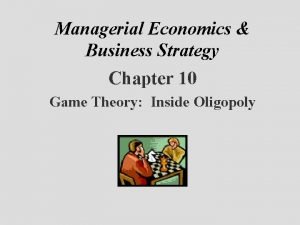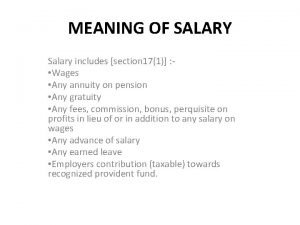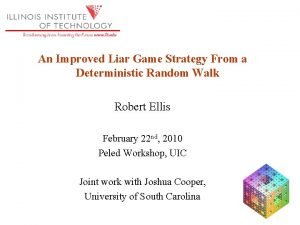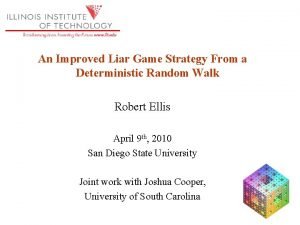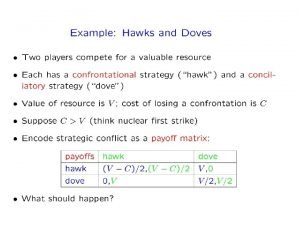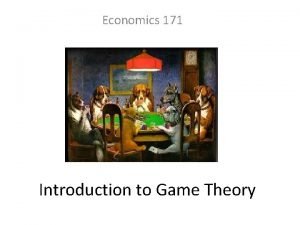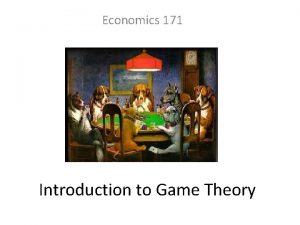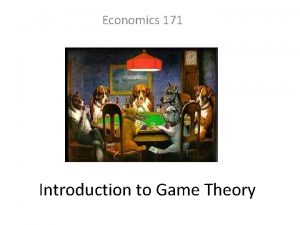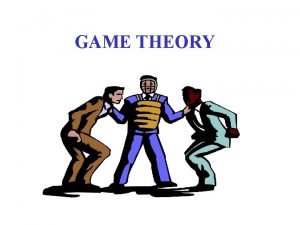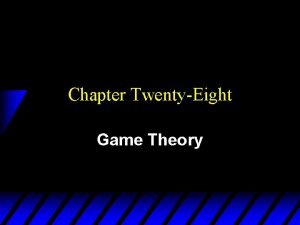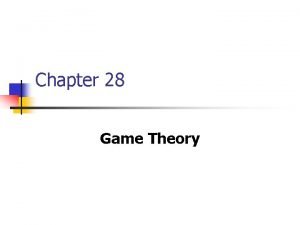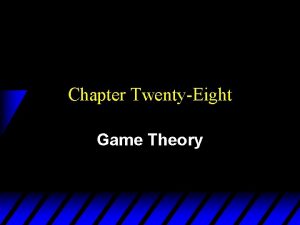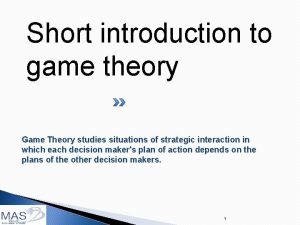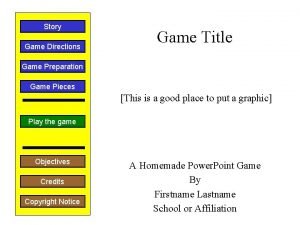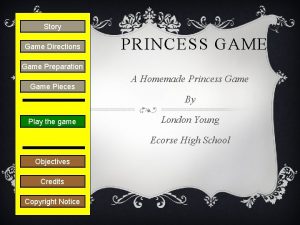Economics 171 Introduction to Game Theory Course requirements






















- Slides: 22

Economics 171 Introduction to Game Theory

Course requirements • Class website Go to economics department home page. Under Links, find Class pages, then click on Econ 171 • Textbook: Games, Strategies, and Decision Making by Joseph E. Harrington, Jr. • Clicker available at campus bookstore i>clicker Register your clicker at www. i>clicker. com/registration

Office Hours • Location: 2052 North Hall • Times: Wednesday, 2: 00 -3: 30 and by appointment

Is this the course for you? • Regular assigned reading and homework. • Frequent unannounced in-class quizzes—some with clickers, some pencil and paper. • Strict grading. • Challenging, but I hope interesting.

Cheating • Sorry to have to mention this, but it has been a problem recently. • If I catch you cheating, for example, by copying homework or exams, you will fail the course and I will turn the case over to university authorities. • University ruling: “Being copied counts as cheating, just as much cheating as copying. ”

Assignments: See class website Week 1 January 8 and 10. Readings: Harrington: Chapters 1 and 2. Complete readings by Thursday, Jan 10. As you read, do the "Check Your Understanding Exercises. " Answers to these are found in the back of the book. You do not need to turn these in, but you should do them. Homework: Due January 10: problems 2 and 3 pp 49 -50

Extensive game: Perfect Information • Players take turns making moves. • Each player knows the rules of the game and the payoffs of each outcome to all players. • Whenever it is somebody’s turn, he or she knows everything that has happened so far.

An Example:

Example: Incumbent and Challenger • Incumbent firm holds a monopoly • Challenger considers entering and sharing the market. • If challenger enters, incumbent decides whether to fight him or share the market.

Extensive Form Games with Perfect Information Example: The Entry Game Challenger Challenge Stay out 0 1 Incumbent Give in 1 0 Challenger’s payoff Incumbent’s payoff Fight -1 -1 Challenger’s payoff Incumbent’s payoff

Vocabulary for Extensive form games Decision Tree Decision Node-Specifies whose turn Branches-Options Terminal Node—End of play Payoffs—For each person at each terminal node. • Strategy—What will you do at each decision node where it is your turn • • •

A Kidnapping Game • Kidnapping is risky and dangerous, but could be profitable. • Will victim’s friends pay a ransom? • If they do pay a ransom, why should you free the victim? • If they don’t expect you to free the victim, would you expect friends of victim to pay ransom?

Kidnapping Game

Vocabulary for Extensive form games Decision Tree Decision Node-Specifies whose turn Branches-Options Terminal Node—End of play Payoffs—For each person at each terminal node. • Strategy—What will you do at each decision node where it is your turn • • •

Extensive form: Imperfect Information • When you move, you don’t always know what move the other guy has made. • Often motivated by simultaneous move games.

Example: Copy cat game (matching pennies) • Little brother wants to do everything that big brother does. • Big brother is embarrassed by this. Wants to do opposite of what little brother does.

Complete Information: Big brother moves first Big Brother H T Little Brother H 0 1 T H 1 0 T 0 1

What would happen? • What would you predict if big brother moves first? • What would you predict if little brother moves first?

Incomplete Information: Simultaneous move Big Brother H T Little Brother H 0 1 Information set: T H 1 0 T 0 1


Clicker Trial Run A) Do you have a working clicker? B) No, I am just pressing the button on my ballpoint

See you on Thursday… Don’t forget your homework. (or your clicker. )
 Game theory managerial economics
Game theory managerial economics Pg 171
Pg 171 29052007
29052007 Forms of decir
Forms of decir Nonlinear pricing strategies
Nonlinear pricing strategies Ai 171
Ai 171 Ai 171
Ai 171 Meaning
Meaning 171 nomreli mekteb
171 nomreli mekteb 171 nomreli mekteb
171 nomreli mekteb Decret 171/2015
Decret 171/2015 Hazardous materials table
Hazardous materials table Cs 171 uci
Cs 171 uci 171 in binary
171 in binary 171 sayli mekteb
171 sayli mekteb 171 nomreli mekteb
171 nomreli mekteb Pirate game sheet
Pirate game sheet Game lab game theory
Game lab game theory Liar game game theory
Liar game game theory Liar game game theory
Liar game game theory Game theory and graph theory
Game theory and graph theory School of business and economics maastricht
School of business and economics maastricht Mathematical economics vs non mathematical economics
Mathematical economics vs non mathematical economics
